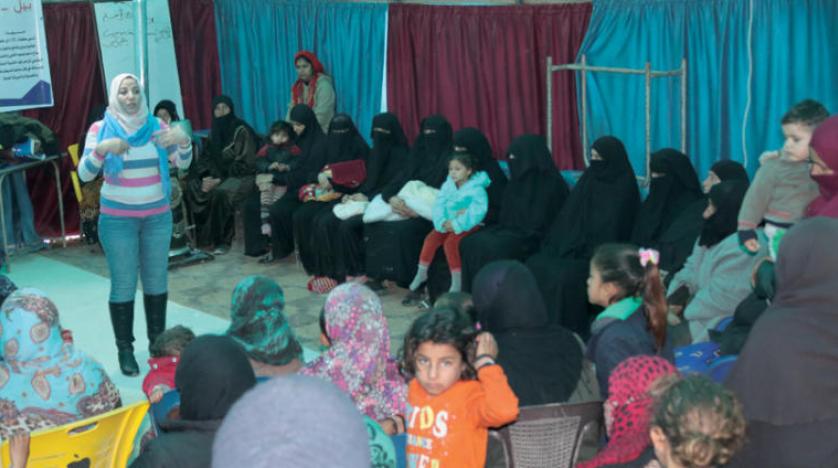Taa Marbouta
Women from Raqqa remember the days of «ISIS» after its elimination in Syria

AL Raqqa (Syria): By Kamal Sheikho
“They prevented women to go out”, “forced girls to marry the fighters of the organization” … stories and tales narrated by the women of Al Raqqa, who lived under the rule of the terrorist ISIS organization, after the announcement of the elimination. Where many people were speculating about the role played by the organization’s fighters, especially foreigners from far distances, taking into consideration the advantages they promised, most notably the marriage of girls in the spring of life and the acquisition of Sbaya.
Anoud (43 years old) from the city of Al Raqqa tells how she was stopped while going to the market one day, by a patrol of the police organization of women Device, and was investigated because she stood and greeted the son of her neighbor, who was under 13 years old, On the charge of being alone with a stranger, where she said to them: «he is the son of my neighbor and is still a child, how alone while I said him hi in a commercial market in front of all people ?! The interrogator screams out loud: This is not permissible, but the patrol allowed her to return to her home and not to leave her except with her guardian.
Malak,A 30-year-old woman, tells a story similar to what Anoud said. She once went out with her 15-year-old son, Ahmed, after being burned by the stove fire in the house, and faced an embarrassing situation in proving that he was her son, when I was stopped by Al Hesba patrol, they began to interrogate me; who is it? And what does he do with me? I told them again and again that he is my son, and I swore to them, but no one believed me, “and asked them to go home.”
Maryam, a woman at the beginning of her fourth decade living in Hisham ibn Abd al-Malik Street in the center of the city of Raqqa, says that after the organization took control of her hometown, her eldest daughter, 11, and her nine-year-old sister were studying at the neighborhood school. “My daughters, like all the other girls, used to go to school. At first ISIS refused blue dress and the government curriculum. Then they asked for private dress, so I decided not to go to school. “
After the elements of the radical organization called for the control of the entire city of Raqqa in January 2014, its elements intervened in the style of the educational system. They imposed uniforms on the teachers and students in the schools of Raqqa and prevented the study of the curriculum of the Syrian government.
Many of the women who lived through the organization’s period cited many sad and painful stories during the sessions organized by the Taa-Marbouta project. The trainer and feminist activist Mona Freij, who organized many meetings with the women in cooperation with the project, said: Many women cited that many of them were afraid of their daughters when they went out of the house. They were afraid if a member of ISIS group decided to marry her. This element might be an Arab or foreign fighter. “He is a suicide bomber or a fighter at the fronts, and after his death the girl gets pregnant at the beginning of her life, the situation gets more complicated by the presence of young children without fathers and aren’t recorded in the Civil Registration Department.”
Many women preferred to prevent their daughters from leaving the house, which was the most effective way to get rid of those fears. “Many women reported that their daughters were deprived of education, did not complete their childhood normally, and did not see parks or public markets for fear of Unknown fate by marrying elements of the organization ».
The campaign of Taa-Marbouta is a women’s project targeting women in north-eastern Syria, especially those who have experienced the organization’s control period, according to Lana Haj Hassan, the Project Director.
Through its regular activities, the project aims at empowering and reintegrating women into society and helping them to get rid of the extremist ideas imposed by the organization in its various forms.
The organization governed approximately 8 million people at the height of its power in mid-2015, and terrorized people. The Organization was expelled from its last stronghold in Syria, the end of last month. On March 23, the Syrian Democratic Forces announced the elimination of ISIS Organization control in eastern Syria following an attack launched six months ago with the support of the US-led international coalition, which managed to control the last enclave of the organization in the town of Al Baghouz, in the eastern banks of the Euphrates River.
Quoted from Middle East












